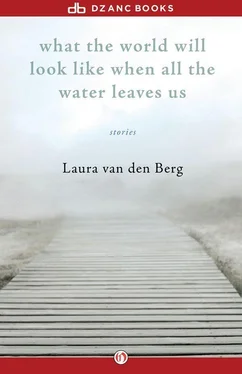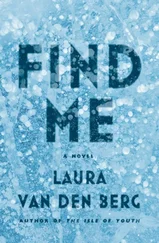She set aside the newspaper and the dumplings and looked at the mask. While waiting for the cab, she’d considered leaving the shop door unlocked or maybe even propped open, but it saddened her to think of the masks being stolen or vandalized. Darnel had been counting on her to close tonight and probably wouldn’t return to the store until morning. She wondered what he would do when he found the mask missing. Come to her apartment, call the police. Or just let it go. It had cost him some money in Bali; the price tag said eight hundred dollars, although that was probably twice what he paid. Maybe he’d be so glad she went quietly, he would be willing to accept the loss.
It was dusk. The city lights beamed; the sallow moon hung needlessly in the sky. Joyce thought she heard the faint ring of a phone and imagined her anonymous caller dialing the number of another apartment, grabbing someone else’s life by the throat and shaking it. She pressed her hands over the mask’s white teeth, as though she was keeping something from leaking out. The onyx and amazonite glistened like drops of black and turquoise paint. She considered taking it to the library tomorrow and checking out more books about death masks and their powers. She only knew they were supposed to transform the wearer in the afterlife, to make them braver and luckier and happier, to help them find their way through a new kind of world.

All evening, the men spoke only of the monster.
Although I sat at their table in the quaint hotel bar — known as the malt shop, due to the hundreds of malt whiskey selections — and was a scientist myself, I wasn’t a part of the conversation. In truth, I thought their pursuit unworthy. The four scientists had been commissioned by the BBC to debunk the legend of the Loch Ness Monster, while I, a botanist who specialized in the preservation of endangered plant life, was working with the Botany Institute of Britain to perform field research on rare plants.
I had been in Inverness for a week and had experienced little contact with anyone at the Craigdarroch except Sarah, the proprietor, and the monster hunters, as they were called. Three of the men were from London. The fourth man, McKay, operated the mini-submarine, a steel contraption that resembled a large gray egg. He was a native of Inverness, a local expert on the Loch Ness Monster, and had learned about submarine technology as a young man, during his army days. He dressed shabbily, his pants often torn at the knees, and whenever he checked the time, it was his practice to take out his pocket watch and swing it in front of his face, as though he was trying to hypnotize himself. He was also Sarah’s husband. They’d been married for fifteen years. This afternoon, when I returned to the Craigdarroch after a day of field work, I’d come upon them arguing in the lobby. Their voices were low, but there was tension in their expressions, in the sweeping gestures of their arms. They fell silent after seeing me in the lobby, and I’d hurried past them and up the stairs.
That night, as I drank my second glass of merlot, I listened to the men, who were outfitted with sonar sensors and giant nets and aquatic cameras, discuss their findings. Or, as it were, the lack thereof.
“The sonars have picked up nothing,” Ian said, adjusting his round eyeglasses. “Not even the slightest disturbance in the water.”
“Did you actually think you were going to find a plesiosaur?” Theodore emptied his glass before turning to me. He was the tallest of the men, with a long nose and high cheekbones. “The most common Loch Ness theory proposes the monster is a plesiosaur, a species that was extinct sixty million years ago.”
“An elasmosaur,” Dale said. “A member of the plesiosaur family.” He was the shortest of the scientists and wore flannel shirts with the sleeves cuffed to his elbows. “And they became extinct seventy million years ago. Not sixty.”
The Loch Ness Monster — although I’d given it little thought before coming to Inverness — now seemed much like the fog that hung over the lake and hills: suggestive and hazy and constantly present. The locals lived peacefully with the legend, profited from it even, with gift shops that carried Loch Ness Monster tee-shirts and coffee mugs.
Theodore stood, knocking back his chair, and skulked over to the bar for a refill. Sarah was working in the malt shop that evening, occasionally refilling our glasses and polishing the mahogany bar. After tending to Theodore, she pulled a chair up to our table; when our eyes met, she smiled. We were, for the time being, the only women residing in the Craigdarroch.
It was then McKay looked across the table at me and said, “They aren’t underwater like I am. Nothing shows up on the sonar, that’s true, but near the bottom of the lake, I’m telling you, there’s something strange.”
“He’s never been able to stay away from the Loch,” Sarah said. She was petite and fair, her cheeks ruddy from the weather. Her wedding ring was a plain gold band which, I’d noticed, she had a habit of pushing around her finger. “I joke that it’s his first love.”
“Why don’t you tell Emily about the underwater caves,” Theodore said, raising his glass. “May be that’s where Nessie is waiting.”
“You should go down with me sometime.”
Theodore shook his head. “I prefer dry land.”
“Have you ever been down with him, Sarah?” I asked.
“No.” She reached across the table and picked up McKay’s beer. She held it in her hands for a moment before taking a sip. “I suppose I prefer dry land too.”
“Are there really underwater caves?” I imagined dark holes where aquatic weeds and ferns flourished, hornwort and eelgrass clinging to slippery gray rocks.
“Yes,” Ian said. “There are.”
“But our sonars are so sensitive, if there were anything in the caves, we’d know,” Dale said.
“Absolutely,” Theodore said.
Ian nodded. “Without a doubt.”
“You think you know so much,” McKay said. “You think everything can be measured.”
Sarah began to say something, but he shook his head and she stopped. He said that he didn’t want to start an argument, that he’d said all he had to say for tonight. True to his word, he did not speak for the rest of the evening.
After we decided to retire, he helped Sarah clear away the glasses. When they were both behind the bar, I noticed her pausing to touch the space between his shoulder blades, or to run a hand down the side of his body. He had a strange way of polishing glasses. He jammed the little towel inside and twisted it around, then held the glass to the light and repeated his method three or four times before adding the glass to the shelf, as though he was able to see imperfections that weren’t visible to the rest of us.

Later that night, back in my room, I listened for the bagpipes. The music usually began around midnight and ceased at two in the morning. When the weather is good, Sarah had said while checking me into the Craigdarroch last week, a trio of bagpipers stand on the edge of the Loch and play in hopes of rousing the monster. On some nights, I’d closed my eyes and listened so intently that, for a moment, I mistook the music for a prolonged and ragged wail.
The Inverness weather was the perfect habitat for what I was seeking: the Linnaea borealis , or twinflower. I should have felt exhilarated by the variety of plant species that thrived in the lush forests and by the esteemed botanists on the research team (all of whom were from Scotland or elsewhere in the UK and, if not ensconced in their own homes, staying with friends or relatives; I was the only one in need of a hotel). The population of twinflowers had declined in recent years, due to an increase in the mechanical harvesting of timber, but even in the protected areas, they still weren’t flourishing, and I had been given the opportunity to help understand why life had become such a struggle for them. Yet I could not shake the loneliness that had settled in months earlier and clung as stubbornly as the fog to the hilltops.
Читать дальше














